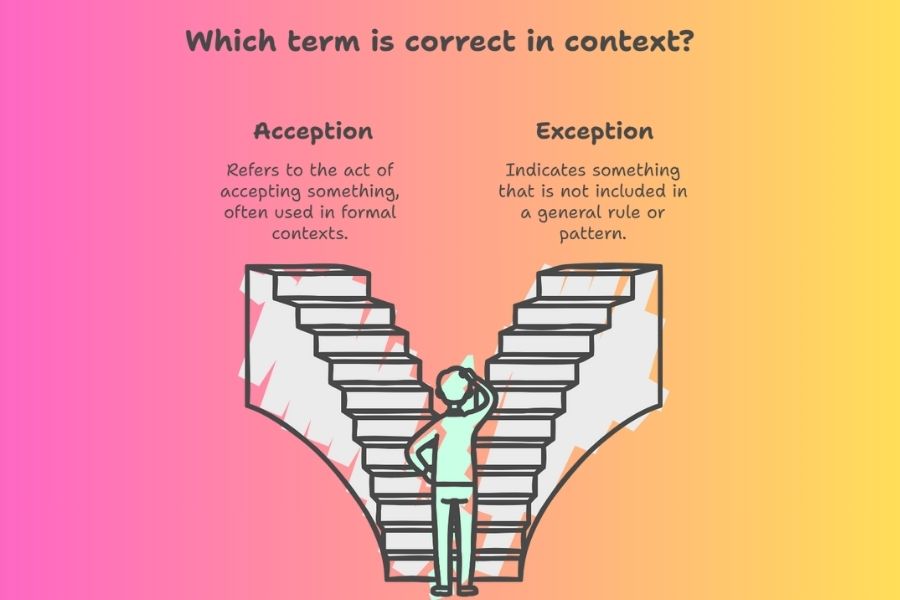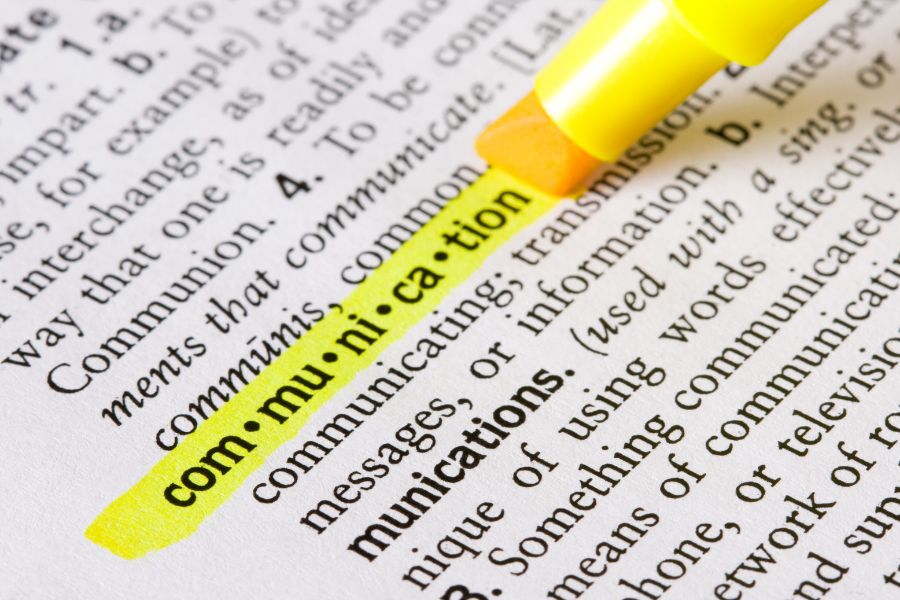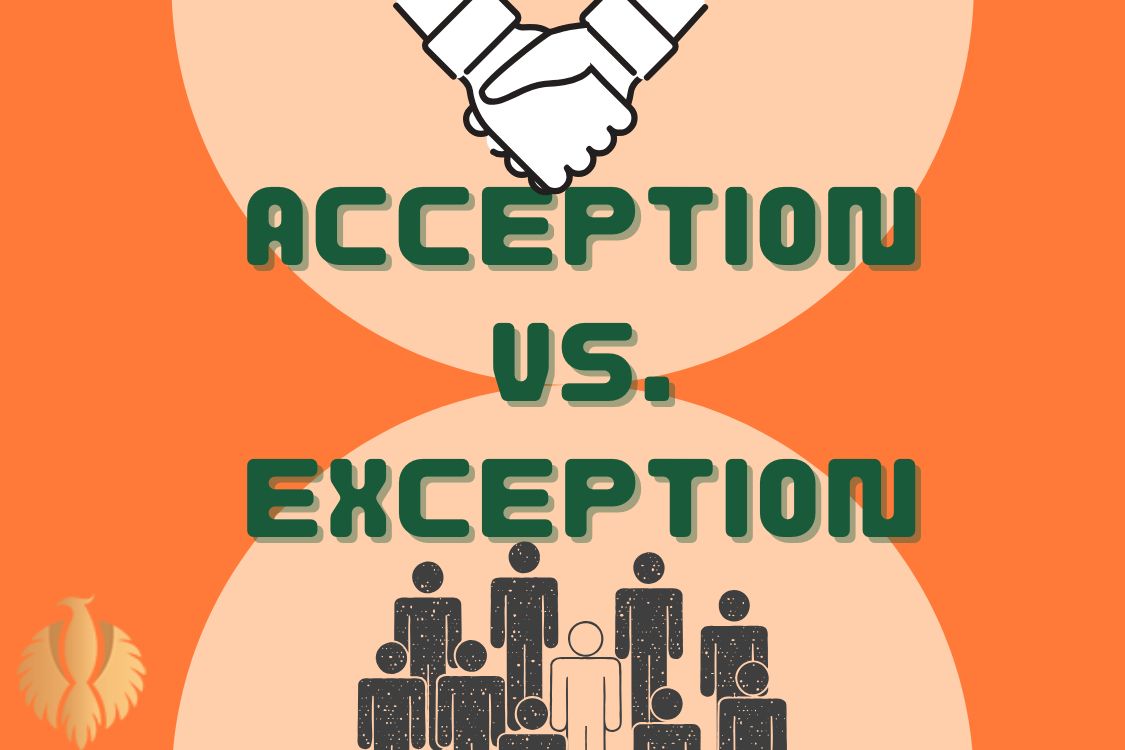Have you ever been confused by the words ‘acception’ and ‘exception’? Well, you’re not alone; but only one of them actually exists in modern English. ‘Acception’ is an archaic (outdated) term that has been replaced by ‘acceptance’ meaning agreement or approval, while ‘exception’ is a completely different word, meaning something that doesn’t follow the rule.
In English, many examples of words usually get mixed up with each other, and cause confusion and mistakes among many learners.
This might be because they have very similar spellings or pronunciations.That’s exactly the case with acception and exception.
Although they share similar letters and sounds, these two words are completely different from each other, in both meaning and usage.
In this case, one of them does not even exist anymore!
Exception is a well-known and widely-used word, which you will find in everyday conversations, legal documents, academic texts, and grammar explanations, as it carries a slightly formal tone.
It basically means something that doesn’t follow the general rule, norm, or expectation.
It is a flexible and necessary word in the English language, whether used in formal writing or informal speech.
However, acceptance, which means agreement or approval, has replaced the old-fashioned and out-of-date word ‘acception,’ which originally meant a particular connotation or interpretation of a word and is not used anymore.
These two words have very quite different meanings and usages.
Therefore that could never be used interchangeably, despite having similar spellings and pronunciations.
In this article, we will discuss their meaning, spelling, use, numerous examples, and also their differences.
You Might Also Enjoy: Leaves vs. Leafs: Differences + Examples
What is ‘acception’?

Acception is a rare and outdated word that once existed in the English language.
Historically, it was used to refer to a specific meaning, sense, or interpretation of a word or phrase.
In this context, referring to “an acception of a term” basically meant pointing to one of its accepted definitions and meanings, or as we call it, ‘acceptation’ these days.
This word changed as English evolved and standardized over time.
Therefore, acception is now no longer used and is considered archaic.
If a word is labeled as archaic, it means that the term is old-fashioned and needs to be replaced.
Nowadays In modern English, the word has been almost entirely replaced by acceptance, especially when referring to agreement or approval, and by terms like meaning or interpretation when talking about word definitions.
As the form of this noun changed from ‘acception’ to ‘acceptance’ the meaning was altered a bit as well.
The word acception has its roots in Middle English (accepcioun), which was borrowed from Middle French (accepcion), and ultimately from the Latin term acceptiō pooacceptiōnis, which means “acceptance” or “a receiving.”
The form of the word itself is accept combined with the suffix , -ion, which has the meaning of the action or of the result of a process.
Here are a few examples of how the word acception appeared in historical texts:
“The word has diverse acceptions, each suited to the matter at hand.”
“The law, in its original acception, did not apply to trade or commerce.”
“The acception of this term has changed over time, reflecting shifts in cultural values.”
Despite appearing in historical texts, this term is no longer used in Modern English and is considered archaic.
This word is so unfamiliar to most native speakers that while coming across this phrase they might mistake it for a typo or an incorrect form of acceptance or exception.
For clarity and accuracy, it’s best to avoid using acception altogether in both writing and speech.
Instead, use words like meaning, interpretation, or sense depending on the context you have in mind.
What is ‘exception’?

Exception is a frequently used word in modern English, in contrast to acception, which has long fallen out of use.
This term appears frequently in scientific articles, legal contracts, and everyday conversations.
But what exactly does it mean?
Here are different definitions of this term provided by some dictionaries:
Cambridge dictionary:
Someone or something that is not included in a rule, group, or list or that does not behave in the expected way.
Oxford dictionary:
A person or thing that is not included in a general statement
Longman dictionary:
Something or someone that is not included in a general statement or does not follow a rule or pattern
The word exception dates back to the late 14th century, which was originally spelled as excepcioun.
It refers to the act of leaving something out or excluding it from a rule or a certain condition.
The term originated from Anglo-French excepcioun, which was used in legal contexts by the late 13th century to mean a formal objection or protest made by a defendant.
This was derived from Old French excepcion, and ultimately from the Latin word exceptionem (nominative exceptio), which meant “an exception, restriction, or objection.”
The Latin verb excipere (meaning “to take out”) is the source of this term, reflecting the idea of excluding something from a general rule or situation.
Also, many learners seem to confuse ‘exception’ and ‘exemption’ due to their similar pronunciations and spellings.
However, they have different meanings and are used in different contexts.
Exemption means being excused from a rule, while exception refers to something that deviates from the rule.
Here are some examples to help you understand how to correctly use exception in a sentence:
“The new rules of the office apply to all of us, without exception.”
“Everyone seemed to really like my ideas, with the exception of John.”
“ We do not accept credit sales or cheques, but for you, we’ll make an exception.”
“Most languages use gendered pronouns, with the exception of Persian and a few other languages.”
You Might Also Enjoy: Receive vs. Recieve: Correct Spell + Examples [2025]
Acception vs. Exception: Side-by-Side Comparison

Now that we have examined each word separately, it’s time to make a direct comparison between the two.
Despite having somewhat similar appearances and sounds, acception and exception have completely different meanings, usages, and applications in contemporary English.
To the untrained ear, the two words might sound like homophones.
Therefore, many students make the mistake of thinking that they’re the same word because of their similar pronunciation.
The most important thing to know here is that only one of these words is still commonly used today, and that word is ‘exception’.
It’s a familiar term that appears in everyday speech, legal language, academic texts, and grammar explanations.
In contrast, acception is considered archaic, meaning it is outdated and no longer used in contemporary English.
To the point that many native speakers have never encountered it.
Historically, in terms of meaning, acception denoted a particular sense, definition, or understanding of a word or phrase, or what some might call ‘acceptation’ these days.
For instance, you might see an ancient document referring to “an acceptance of a term,” signifying one of its recognized meanings.
Nonetheless, this usage has diminished, and in contemporary English, we would now express acceptance, acceptation, interpretation, or just meaning instead.
On the other hand, as mentioned before, exception refers to something that does not follow a rule or norm.
It is the single case that deviates from the general pattern. For example, “Everyone passed the test, with one exception.
” As you can see, this concept is still highly relevant and useful in communication.
Spelling and pronunciation guide

Because acception and exception look and sound quite similar, it’s easy to see why English learners—and even native speakers—might mix them up.
It’s completely natural and it could happen to any learner at any stage of learning.
Below is a full pronunciation walkthrough to help you never mix up these two words again.
Exception starts with the prefix “ex-,” which often indicates something going out or being set apart (like exclude, exit, exhale, or external).
Acception is actually archaic and no longer in use in modern English.
It used to refer to the accepted meaning or sense of a word, but today we use acceptance instead.
In terms of pronunciation, they have nearly identical sounds which makes it even easier to confuse in spoken English.
They wouldn’t get mixed up as much in written English since their spellings are a bit more different than their pronunciations.
Exception: /ɪkˈsɛp.ʃən/ → ik-SEP-shun
Acception: /ækˈsɛp.ʃən/ → ak-SEP-shun (archaic)
Although the initial vowel sounds differ slightly (ik- vs. ak-), they are so close that you may not even notice the difference, which is another reason why spelling really matters here.
You Might Also Enjoy: Into vs. In To: Differences + Examples + Grammar[2025]
Examples
exception
Plenty of examples are provided with ‘exception’ and ‘acception’ to ensure correct usage of the term.
1. Everyone in the company attended the mandatory meeting, with the exception of Terry, who was out sick with the flu.
2. Most people agreed with the proposal during the meeting, but Sarah made an exception and raised her concerns.
3. The dress code applies to everyone—no exceptions—not even those in management.
4. I enjoy reading a wide range of genres, with the only exception being horror novels, as I find them too disturbing and stressful.
5. They often don’t allow late project submissions, but they made an exception for Daniel because of his family emergency.
6. He follows a strict diet every day, with very few exceptions, even during holidays and celebrations.
7. With the exception of one poorly constructed paragraph, the essay was well-organized and pretty convincing.
8. We all laughed at the joke, with the exception of Sam.
9. Everyone was in agreement, with a few minor exceptions.
10. All of the borrowed library books were returned on time, with the exception of the one that had been misplaced recently.
11. There are a few exceptions to this grammar rule, especially when dealing with irregular verbs in the past tense.
12. Children under five years old are the only exception to the ticket fee requirement at the amusement park.
13. Every employee was required to participate in the urgent HR meeting session, without exception or special consideration.
14. The museum is open every Saturday throughout the year, with the exception of major public holidays like New Year’s Day.
15. We rarely grant extensions for assignments, but we made an exception due to the student’s hospitalization.
16. There’s an exception to every rule, and in this case, it allowed us to reconsider the original decision.
17. He is generally very patient and calm, but losing his passport at the airport was an exception that made him act that way.
18. You’re the only exception to my policy of not mixing business with personal relationships.
19. The discount applies to all products in the store, with a few notable exceptions such as electronics items.
20. Her work was nearly flawless; there wasn’t a single issue to note, no exceptions at all.
21. The new safety regulations must be followed by every department, without exception or delay.
22. Everyone was expected to complete the survey, with the exception of those who had already participated last year.
23. All the basketball team members are required to wear uniforms during matches, and there are no exceptions to this rule.
24. The flight was smooth for the most part, the only exception being a brief period of turbulence over the mountains.
25. He supports most of the company’s new policies, but the recent change in the dress code is an exception for him.
You Might Also Enjoy: When Do You Say Good Evening vs. Good Night?
Acception (old-use)
1. In his work, the philosopher used the term in its original acception, referring to moral reasoning.
2. The acception of this word, as it appears in 17th-century literature, differs from its modern usage.
3. He clarified that his interpretation followed the theological acception of the term ‘grace’.
4. Some readers misunderstood the acception in which the author used the term ‘justice’.
5. In ancient texts, one must often identify the specific acception intended by the speaker.
6. This acception of ‘law’ includes both civil and natural understandings.
7. In this old book, the word was used in a different acception, meaning a special way of understanding it.
8. The word was employed in a rare acception, meaning ‘threat’ rather than ‘warning’.
9. He noted that this acception had fallen out of common use by the 19th century.
10. In that passage, the acception of ‘spirit’ clearly points to character, not a supernatural being.

Hi, welcome to my blog! My name is Omid and I am thrilled to have you here! I am an English language teacher with 12 years of experience and hold multiple international certifications (TESOL, IELTS, TOEFL, PTE, CELTA). Additionally, I hold a PhD in Applied Linguistics with a specialization in Teaching English as a Second Language (TESL), which fuels my passion for teaching English and assisting others in mastering the language. To me, nothing is more rewarding than helping individuals enhance their English language abilities through various methods. So, let’s embark on this journey of learning English together.




